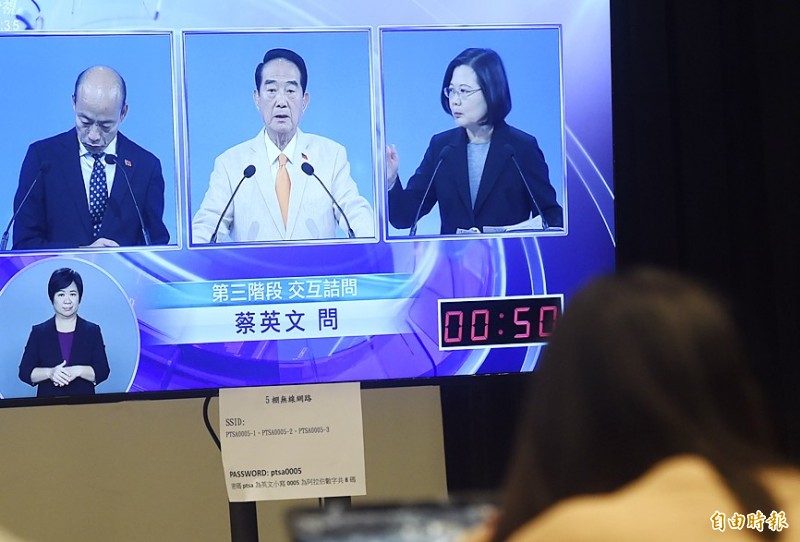《TAIPEI TIMES》 Candidates clash in presidential debate

From left, presidential candidates Kaohsiung Mayor Han Kuo-yu, People First Party Chairman James Soong and President Tsai Ing-wen are shown on a monitor during a televised presidential debate in Taipei yesterday. Photo: Chien Jung-fong, Taipei Times
By Ann Maxon / Staff reporter
President Tsai Ing-wen (蔡英文), Kaohsiung Mayor Han Kuo-yu (韓國瑜) and People First Party Chairman James Soong (宋楚瑜) in Taipei yesterday sparred over cross-strait policy, online influence campaigns and the nation’s energy plan in their capacity as presidential candidates during the cross-questioning segments of the sole presidential debate.
Han, the Chinese Nationalist Party’s (KMT) candidate, drew to speak first.
He asked Tsai and Soong whether they are religious and whether they think he would go to hell if he performed poorly as president and allowed corruption in his administration.
Due to his belief in the existence of gods, “I would never dare do anything bad, including hugging women and drinking alcohol, which some have accused me of doing,” he said.
Soong said he believes in the existence of gods and that politics is about taking care of the people.
Good policies would be remembered because members of the public are fair and good, he said.
Tsai said that every Taiwanese has respect for gods irrespective of their religious belief, but there are other qualities that also matter in a president.
Based on Han’s previous remarks, including many discriminatory comments about women and immigrants, if he is elected president, “the KMT would be expected to return with authoritarianism, feudalism and reactionarism,” she said.
Tsai then asked Han about signing a statement titled “colorless awakening” initiated by Want Want China Times last year, which pledged to take steps to discuss cross-strait unification.
“I agree with [the pledge] in the sense that they can express their opinions, just like how you agree with Taiwanese independence advocates and are not cracking down on them,” Han said.
Soong said that the two sides of the Taiwan Strait are separately governed using different approaches, with the Taiwanese side following Sun Yat-sen’s (孫逸仙) “three principles of the people,” freedom and democracy.
If the “status quo” is to be changed, it must be a collective decision made by Taiwanese in a democratic manner, he said.
Both sides of the strait should engage in constructive dialogues to ensure peace and avoid military conflict, he said.
In the second round of cross-questioning, Han asked Tsai if there is corruption in her administration and if she would reinstate the Special Investigation Division (SID).
Tsai said that the SID was used as a tool for the KMT’s political feud during former president Ma Ying-jeou’s (馬英九) presidency.
“There is no need to reinstate the SID,” she said, adding that Han’s plan to reinstate the division to investigate the Democratic Progressive Party (DPP) is “the worst example of how a politician can interfere with the judiciary to retaliate against a political opponent.”
Soong thanked Han for not having asked him about corruption and described himself as an honest, decent and competent man.
He then asked Tsai and Han if they would promise to achieve the following in two years: to ensure Taiwan’s participation in at least one international organization; to increase Chinese tourist arrivals to 4 million per year; and to form a new Cabinet across party lines, with each party making up no more than 40 percent of the Cabinet.
“If I cannot complete those things in two years, I will resign from my post,” Soong said.
Han did not answer the question and used the segment to criticize Tsai.
The New Tide faction has been controlling the DPP like cancer, he said.
“You [Tsai] are like a puppet and the faction is the hand controlling it,” Han added.
The way Han imagines the DPP shows he knows little about the way political parties and democracy work, Tsai said.
If re-elected, she would consider appointing any competent individuals to her Cabinet, she said.
She would do her best to promote Taiwan’s participation in international organizations and increase the number of Chinese tourists, but to achieve that, China might require Taiwan to compromise its sovereignty, she said.
In the third round of cross-questioning, Tsai criticized Han for being the “biggest beneficiary of online influence campaigns” due to his strong support online among Chinese and other groups.
In response, Han said he feels like “a good little rabbit facing the big bad wolf.”
Tsai’s administration allegedly hired “cybertroops” to organize online influence campaigns against DPP vice presidential candidate William Lai (賴清德) when he was vying for the DPP’s presidential nomination against Tsai earlier this year, Han said.
If it had not been for Tsai’s online campaigns, he would now be debating Lai instead of her, he added.
In the same round, Soong asked Tsai to clarify her stance on Taiwan’s national status.
Tsai said that she adheres to the Constitution, which should be applied based on the interpretation of the Council of Grand Justices and the will of the people.
Tsai then asked Han to explain his plan to increase the use of nuclear power and handle radioactive waste.
Under Han’s plan, Taiwan would need a fifth and sixth nuclear power plant, she said, asking Han where they would be built.
“I can promise that there would not be a fifth, sixth, seventh or even eighth nuclear power plant built right next my home or your home,” Han said.
He would activate the mothballed Fourth Nuclear Power Plant once its safety could be ensured and if the public agreed to it, he said.
Meanwhile, the use of green energy would be significantly increased once it becomes more affordable, he said.
In addition to a lack of power, Taiwan is also facing a lack of water, land, labor and talent, Soong said, adding: “More importantly, Taiwan lacks good leadership.”
新聞來源:TAIPEI TIMES

















